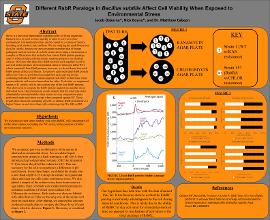| dc.contributor.advisor | Cabeen, Matthew T. | |
| dc.contributor.author | Osborne, Jacob | |
| dc.contributor.author | Boyne, Nick | |
| dc.contributor.author | Cabeen, Matthew T. | |
| dc.contributor.other | Wentz Research Scholars | |
| dc.date.accessioned | 2019-05-23T20:01:26Z | |
| dc.date.available | 2019-05-23T20:01:26Z | |
| dc.date.issued | 2019-04-26 | |
| dc.identifier | oksd_Wentz_2019_osborne | |
| dc.identifier.citation | Osborne, J., Boyne, N., & Cabeen, M. T. (2019, April 26). Different RsbR paralogs in Bacillus subtilis affect cell viability when exposed to environmental stress. Poster session presented at the Oklahoma State University Wentz Research Scholars Symposium, Stillwater, OK. | |
| dc.identifier.uri | https://hdl.handle.net/11244/319772 | |
| dc.description.abstract | Stress is a universal phenomenon experienced by all living organisms. Bacteria have to react to stress quickly in order to survive in their environment. Environmental stress can be caused by a variety of factors, including acid, alcohol, salt, and heat. We are studying the model bacterium Bacillus subtilis, because its stress response resembles that of human pathogens such as Listeria. B. subtilis senses stress using a stressosome, a complex of 80 proteins that includes four variant RsbR protein paralogs, each of which produce a distinct stress response pattern to an identical stressor. We know that these four RsbR proteins work together to aid in survival in the presence of environmental stress in wild-type cells (WT), which contain all four RsbR proteins; however, we do not know how each RsbR protein affects cell fitness. To test how each individual RsbR protein affects survival, we performed a competition assay pairing strains containing individual RsbR variants against each other to determine if one protein aided in cell survival more than the other. To do this, we engineered strains of B. subtilis cells to only contain one of the four RsbR proteins. This allowed us to compete the RsbR proteins against one another on an individual basis. Our preliminary results indicate that the wild-type strain substantially outcompeted the other strains in every competition assay performed under acid stress except when competed against RC. These results show that cells containing only RC or all four RsbR proteins have a higher fitness in acid stress than cells containing only RA, RB, or RD. | |
| dc.description.sponsorship | Lew Wentz Foundation | |
| dc.format | application/pdf | |
| dc.language | en_US | |
| dc.publisher | Oklahoma State University | |
| dc.rights | The author(s) retain the copyright or have the right to deposit the item giving the Oklahoma State University Library a limited, non-exclusive right to share this material in its institutional repository. Contact Digital Resources and Discovery Services at lib-dls@okstate.edu or 405-744-9161 for the permission policy on the use, reproduction or distribution of this material. | |
| dc.title | Different RsbR paralogs in Bacillus subtilis affect cell viability when exposed to environmental stress | |
| osu.filename | oksd_Wentz_2019_osborne.pdf | |
| dc.description.department | Microbiology | |
| dc.type.genre | Presentation | |
| dc.type.material | Text | |
